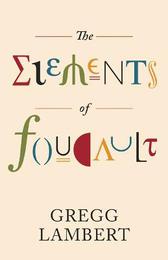
|
The Elements of Foucault
Paperback / softback
Main Details
Description
A new conceptual diagram of Foucault's original vision of the biopolitical order The history around the critical reception of Michel Foucault's published writings is troubled, according to Gregg Lambert, especially in light of the controversy surrounding his late lectures on biopolitics and neoliberal governmentality. In this book, Lambert
Author Biography
Gregg Lambert is Dean's Professor of Humanities at Syracuse University and Distinguished International Scholar at Kyung Hee University, South Korea. He is founding director of the Syracuse University Humanities Center and the Society for the Study of Biopolitical Futures. Lambert is author of thirteen books, most recently In Search of a New Image of Thought: Gilles Deleuze and Philosophical Expressionism and Philosophy after Friendship: Deleuze's Conceptual Personae (both from Minnesota).
Reviews"In this provocative and highly original text, Gregg Lambert challenges the standard view that Michel Foucault's works are discontinuous by showing that Foucault does not leave his past ideas behind, but rather incorporates them into new constellations as he confronts new problems. By introducing a fourth element-milieu-into Foucault's analysis of biopower to supplement the elements of method, dispositif, and grid of intelligibility, Lambert's self-described mutation of biopower will be required reading for any serious Foucault scholar."-Alan D. Schrift, author of Twentieth-Century French Philosophy: Key Themes and Thinkers "Gregg Lambert's study of Michel Foucault's work from the formulation of the concept of discipline to the notion of biopower demonstrates the inadequacy of interpretations that offer either an evolutionary or devolutionary reading of its movement. He shows that, at every step, Foucault both retains and sets aside concepts elaborated in previous texts and does so in a purely provisional manner, subject to perpetual revision. Lambert takes us beyond the too obvious periodizations into which Foucault's work is so often divided and allows us to see the complexity and unevenness that give some of his most important contributions their singular power."-Warren Montag, Occidental College
|